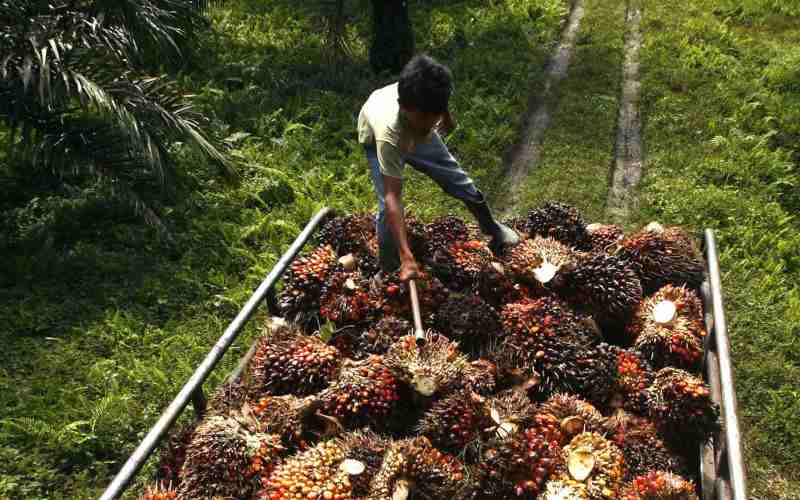
A worker loads palm fruits onto a truck at a plantation in the Luwu district of Indonesia’s South Sulawesi province August 11, 2009.
16:22 JST, November 21, 2022
Tokyo (Jiji Press) — Japanese companies face increasing calls for eliminating human rights violations and giving adequate consideration to environmental protection when building and operating supply chains, ranging from the procurement of raw materials to the manufacture and sale of products.
Palm oil, derived from Elaeis guineensis, or oil palm, grown in tropical areas, is an inexpensive raw material most widely used for processed foods such as bread, confectionery and margarine, as well as daily necessities, detergents, shampoos and cosmetics. Indonesia and Malaysia are the main producers of palm oil.
But child labor at farms and deforestation caused by farm development are increasingly acknowledged as problems. Some companies using palm oil are rushing to switch to products free from issues linked to cultivation methods, while others are hurrying to develop alternative materials.
The RSPO mark is one way to help consumers judge whether the palm oil used in a certain product was produced in a way that is friendly to human rights and the environment. The mark certifies that the product has met certification standards. Some companies inform the public on their websites that their products have received the mark.
The RSPO, or the Roundtable on Sustainable Palm Oil, is an international nonprofit organization founded in 2004 at the initiative of an environmental protection group and Britain’s Unilever and others to set standards to determine whether products are produced by sustainable methods. Household goods makers Kao Corp., Lion Corp. and Osaka-based Saraya Co. are among Japanese members of the RSPO.
Kao uses a large amount of palm oil as a material for detergents and other products. It has been supporting small-scale farms in Indonesia, which has a thriving oil palm industry, to obtain RSPO certification.
Since about two years ago, the firm has been working with Apical Group, a local oil-refining and -processing company, and Asian Agri, which owns large-scale oil palm plantations, to provide support. Kao aims to achieve certification for about 5,000 farms by 2030.
As many small-scale farms are run by families, tackling low awareness of child labor and labor safety measures is seen as a challenge, along with improving production efficiency.
In addition to giving support for RSPO certification, Kao offers education on occupational safety and provides for free agents that make it easier for agricultural chemicals to stick to leaf surfaces. The agents can help raise farm productivity and reduce the amount of agricultural chemicals used, shoring up farm earnings and lessening the load on the environment.
Of the support recipients, some 600 farms are expected to be certified by the end of this year, according to Kao officials.
Certified oil accounted for 27% of palm oil used by Kao in 2021. The company hopes to raise the share to 100% by 2025.
“We hope to offer functions that consumers want from detergents, while giving a high level of environmental consideration so that consumers choose our products,” Junko Otani, head of Kao’s department for environment, social and governance strategy, said.
Additionally, efforts are in progress to secure alternatives to palm oil.
In June, Unilever announced that it would start developing a plant-based alternative to palm oil in partnership with U.S. biotechnology company Genomatica. Unilever plans to invest $120 million, its largest investment related to alternative materials, in the development project. Demonstration tests will be conducted for up to two years to determine whether commercializing the product is feasible.
Unilever has already replaced almost all of the palm oil used at the company with certified oil. With the investment, it hopes to show the industry that it can use a biotechnology-based alternative and expand the range of raw material options, a company official said.
In late September, Kao announced that it would join the initiative and invest in it.
Top Articles in Business
-

Prudential Life Insurance Plans to Fully Compensate for Damages Caused by Fraudulent Actions Without Waiting for Third-Party Committee Review
-

Narita Airport, Startup in Japan Demonstrate Machine to Compress Clothes for Tourists to Prevent People from Abandoning Suitcases
-

Japan, U.S. Name 3 Inaugural Investment Projects; Reached Agreement After Considerable Difficulty
-

Toyota Motor Group Firm to Sell Clean Energy Greenhouses for Strawberries
-

SoftBank Launches AI Service for Call Centers That Converts Harsh Customer Voices into Softer Voices
JN ACCESS RANKING
-

Japan PM Takaichi’s Cabinet Resigns en Masse
-

Japan Institute to Use Domestic Commercial Optical Lattice Clock to Set Japan Standard Time
-

Israeli Ambassador to Japan Speaks about Japan’s Role in the Reconstruction of Gaza
-

Man Infected with Measles Reportedly Dined at Restaurant in Tokyo Station
-

Videos Plagiarized, Reposted with False Subtitles Claiming ‘Ryukyu Belongs to China’; Anti-China False Information Also Posted in Japan




















